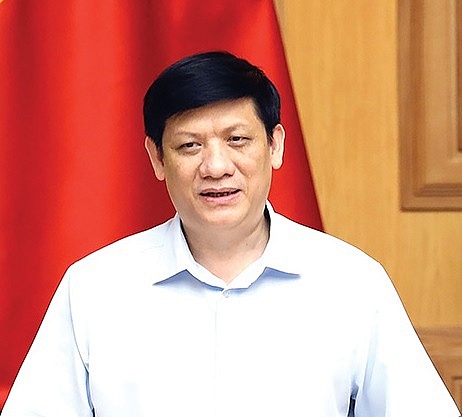Vietnam on board for vaccine tech transfer initiative
| Nguyen Thanh Long - Minister of Health
The World Health Organization (WHO) has selected Vietnam to receive the mRNA vaccine technology through its transfer initiative. This shows that the WHO highly values our capacity to master the technology and produce the vaccine on a large scale and of high quality. The government and the Ministry of Health are committed to supporting and creating favourable conditions for domestic vaccine manufacturers in receiving the mRNA vaccine technology. Although Vietnam is a developing country, we have had a lot of experience in vaccine development over the past decades. Our National Regulatory Authority has also been recognised by the WHO. We believe that in participating in this initiative, Vietnam will produce the mRNA vaccine not only for domestic consumption but also for other countries in the region and the world, contributing to reducing inequalities in access to vaccines. The mRNA vaccine technology allows for an update of vaccines to adapt to new variants more easily and that can be produced in large quantities. This groundbreaking technology not only helps to control this pandemic but also better respond to future pandemics. Therefore, Vietnam hopes to continue receiving support from and to collaborate with the WHO and other partners to go one step further in this initiative, thereby strengthening the production capacity of vaccines in the region and ensuring international and regional health security. |
The World Health Organization (WHO) on February 23 announced that it has already selected five additional countries, including Vietnam, to receive the mRNA vaccine technology through its own tech transfer initiative.
With a global mRNA technology transfer hub being established in 2021 to support manufacturers in low- and middle-income countries to produce their own vaccines, ensuring that they have all the necessary operating procedures and know-how to manufacture mRNA of international standards, this is being deemed a new hope for Vietnam and the other nations selected.
Vietnam is accelerating technology transfer of COVID-19 vaccine production so as to soon have locally-made vaccines to serve growing demands at home.
Having established manufacturing capacity in 15 countries and 25 different manufacturing sites to supply vaccines to every region of the world as quickly as possible, AstraZeneca is selecting a potential partner for the transfer of vaccine production technology in Vietnam, thus helping Vietnamese better approach high-quality home-made pharmaceuticals.
Thus far, technology transfer of some COVID-19 vaccines has been made between Vietnamese firms and international partners. In 2021, contracts with the US, Japan, and others were signed, paving the way for the country to increase vaccine supply.
Last September, one of Vietnam’s leading pharmaceutical companies, VABIOTECH, successfully produced its first batch of Sputnik V vaccines. The company expects to produce five million doses per month before increasing to 100 million doses per year going forward.
Also last year, Vietnamese firms AIC and Vabiotech signed a deal with Japan’s Shionogi & Company to produce COVID-19 vaccines based on recombinant DNA protein technology.
Elsewhere, Arcturus Therapeutics Holdings Inc. signed a technology transfer deal with Vingroup that will allow the Vietnamese conglomerate to begin producing the US company’s vaccines, planned for sometime this year.
Recently WHO director-general Dr. Tedros Adhanom Ghebreyesus said, “No other event like this pandemic has shown that reliance on a few companies to supply global public goods is limiting, and dangerous. In the mid- to long-term, the best way to address health emergencies and reach universal health coverage is to significantly increase the capacity of all regions to manufacture the health products they need, with equitable access as their primary endpoint.”
Vietnam has to date reported more than three million COVID-19 infection cases. As of February 23, it has administered around 193 million doses of vaccine against coronavirus and the country is accelerating booster shots to contain the spread of the Omicron variant.
To date, as many as 23 vaccines against SARS-CoV-2 have been approved for emergency use around the world over the past two years, while many others are still being developed and about to be marketed.
What the stars mean:
★ Poor ★ ★ Promising ★★★ Good ★★★★ Very good ★★★★★ Exceptional
Themes: Healthcare Platform
- Hanoi intensifies airport monitoring amid Nipah disease risks
- Cosmetics rules set for overhaul under draft decree
- Policy obstacles being addressed in drug licensing and renewal
- Sanofi, Long Chau Pharmacy relaunch medicine blister pack collection initiative
- Takeda Vietnam awarded for ongoing support of Vietnam’s sustainability efforts
Related Contents
Latest News
More News
- NAB Innovation Centre underscores Vietnam’s appeal for tech investment (January 30, 2026 | 11:16)
- Vietnam moves towards market-based fuel management with E10 rollout (January 30, 2026 | 11:10)
- Vietnam startup funding enters a period of capital reset (January 30, 2026 | 11:06)
- Vietnam strengthens public debt management with World Bank and IMF (January 30, 2026 | 11:00)
- PM inspects APEC 2027 project progress in An Giang province (January 29, 2026 | 09:00)
- Vietnam among the world’s top 15 trading nations (January 28, 2026 | 17:12)
- Vietnam accelerates preparations for arbitration centre linked to new financial hub (January 28, 2026 | 17:09)
- Vietnam's IPO market on recovery trajectory (January 28, 2026 | 17:04)
- Digital economy takes centre stage in Vietnam’s new growth model (January 28, 2026 | 11:43)
- EU Council president to visit Vietnam amid partnership upgrade (January 28, 2026 | 11:00)


 Tag:
Tag:


















 Mobile Version
Mobile Version